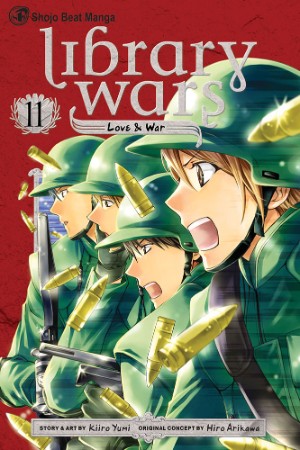By Kiiro Yumi, based on the novel by Hiro Arikawa. Released in Japan as “Toshokan Sensou: Love & War” by Hakusensha, serialization ongoing in the magazine LaLa. Released in North America by Viz.
While there are an unlimited amount of things that you can do when you write a shoujo manga, it has to be said that when a typical reader thinks of one, they tend to think of a basic ‘type’. Kids in high school, girl likes guy, guy eventually likes girl, will they get together, etc. Violence, if any, tends to be emotional brutality or done for comedic purposes. (I recall I Hate You More Than Anyone having to include a ‘note: genuine shoujo manga’ remark after one of its typical over the top gags.) Library Wars runs in LaLa, a magazine which has a large number of these sorts of shoujo manga. So it’s startling to see a full-scale military assault, with blood, casualties and a shaking up of our main cast, with a couple of people seemingly written out of the series.
This is not to say that the series subtitled Love & War is entirely devoid of love this time around. It’s just driven or inspired by the aftermath of the Ibaraki Art Exhibit. Things start off bad with one of the library team’s men getting his arm sniped so he can’t shoot, and get worse when a desperate frontal assault by the enemy means that Iku is forced to shoot them. No one is killed in that particular attack, but it still leaves her a complete wreck – and she’s not the only one, as Dojo points out. The battles we’ve seen before were not like this. It doesn’t even end there, as once everything settles down, a lone man coming in to destroy the exhibit finds himself stopped by Genda… who he them shoots multiple times through the chest.
Amongst this, we have the love. Iku has finally realized her feelings for Dojo are love, much to the satisfaction of Shibazaki, who has known this for ages. Shibazaki and Tezuka get into a brief fight over what his brother was planning, and how much she knew about it (it also has an excellent point about when to reveal info that could potentially devastate the troops – the answer is not before a major battle). Even Genda and his estranged lover have a sort of reconciliation at his hospital bed. There are warm fuzzies here to be found if you so desire.
But mostly what I take away from this volume is what it means to be a soldier, and how trying to defend your beliefs can lead to the use of force. The opinions given here are biased towards the library soldiers, of course – they’re our heroes. The ‘nonviolence’ protestors are papers tigers for the most part, serving mostly to get Iku really, really angry. As we reach the end of this volume (which finishes adapting the 3rd novel), you sense there’s a major shakeup in the works. Commander Inamine is forced to resign, and I get the feeling that the implication of Genda’s 2-rank promotion is that he won’t be back either. I’m not sure where this battle-filled shoujo manga is going, but this was one of its most gripping volumes. Readers who thought it started slow may want to give this a try.


This series just gets better and better. I’m glad that they’ve finally dumped all the pointless “secrets” — the identity of Iku’s Prince, Iku’s keeping her job from her family, Tezuki’s brother, Shibazaki’s intelligence work, etc., etc. Iku finally achieving a measure of competence at her library work is also much appreciated.
Nonetheless, Iku continues to be the Weepiest Soldier Evah. I lost count of how much time she spent crying in this volume, even though much of it was justified.
Also worth noting — this might be the “steamiest” volume yet, inasmuch as there is actually a pictured kiss (!) — even if it’s only in a fantasy sequence — which is certainly a step up between the usual Iku / Dojo interaction of yelling, punching, hugs, and head pats.